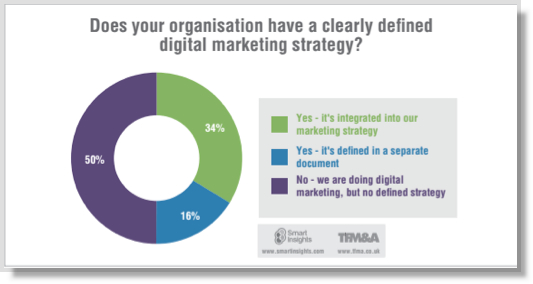
A digital marketing strategy is an absolute given for any company trying to market itself online – right?
That’s certainly the impression you’d get from reading most digital marketing blogs, where the question of whether you should have a digital marketing strategy has long ago been eclipsed by how to develop one.
And yet, on the ground, most companies remain unconvinced.
A new report by Smartinsights.com, Managing Digital Marketing 2015 , shows that a full 50 percent of marketers have active digital marketing programmes, but no defined strategy at all. This is actually a slight increase from the previous year, when the figure was 46 percent.
The other half is divided between those who have a stand-alone digital strategy (16 percent), and those who have integrated it into a more general marketing plan (34 percent). The latter are probably more advanced marketers, for whom digital marketing has become ‘business as usual’.

I’m sure that many of the 50 percent of companies that do not yet have a written strategy are using digital media effectively and could certainly be getting results from their search, email or social media marketing.
Perhaps they even have good reasons not to create a strategy.
Companies often tell me that they already have enough strategies and plans, and that they are rarely referred to; that putting their strategy down in writing will create problems of integration and ownership; that digital plans are not useful, as technologies and marketing approaches change so fast; and that they simply do not have the resources or time to create one.
But I am equally sure that they would benefit from writing down their approach.
Here are five reasons why:
1. A written strategy gives you direction and focus
Companies that have not written down their approach may have a general sense of what they want to do online and what their tactics are, but are unlikely to have properly defined some of the essential elements.
For example, they may know that they want to get more visits to their website, but can they say how many? They may want to gain more customers, but can they pinpoint by what percentage, or through which channels?
Without specific goals, it’s harder to know exactly what you need to do online, and later to measure how successful you are.
Creating a written strategy forces companies to tackle these crucial questions, as well as formulate a powerful online value proposition, narrowly define the target audience, and carefully consider all the other building blocks for an effective digital programme.
2. It ensures everyone is on board – and on the same page
Ensuring that there is broad support for your digital activity within your company can be difficult.
This is much easier to obtain if you have written documentation that spells out what you are aiming to accomplish, how it fits in with the company’s other marketing priorities, and gives you a way of measuring whether it’s working or not. Suddenly you have a digital programme that can be promoted and defended, rather than just “something some of us dabble in.”
Moreover, it ensures that there is a vision and method that everyone has to sign up to. Without a written strategy, every manager and director is free to project their own aims and priorities on the online activity, and all too often, the result is that everyone is working at cross-purposes without ever realising it. Clarity is essential!
3. You’ll be better resourced
If you’re working without a strategy, it will be harder to work out in advance what budget your digital programme needs in order to succeed, and what kind of skills your staff need to execute it.
Sure, you can apply for more funding and hire staff as and when the need arises, but you’ll always be on the back foot. Surely it would be more efficient – and easier to successfully make the case – if you were able to present a long-term plan for budget and staff members?
4. It will limit duplication
Even if you do have sufficient resources, these may be wasted without a strategy in place to use them efficiently.
This is particularly the case in larger companies where you see different parts of the marketing organisation purchasing different tools or using different agencies for performing similar online marketing tasks. A written strategy, in this case, is about getting better organised.
5. It will help you optimize and stay ahead
Every company with a website will have analytics, but many senior managers don’t ensure that their teams make or have the time to review and act on them.
A strategy will build testing into your programme, ensuring that continuous improvement is possible.
It will also help you optimise. A good strategy will benchmark your activity and clearly set out what goals you need to hit online, enabling you measure what’s working and what isn’t, and make the necessary changes. Again, regular reviews will be built into the system, as long as you have a document to refer back to.
Writing a strategy does not need to be complicated. Start off with one or two pages describing your goals, tactics and KPIs: That alone will make an enormous difference to your online performance, and you can build a more comprehensive document later down the line.
“FREE” LinkedIn Webinar
Over the past couple of months I’ve received a ton of emails from readers asking me to share more insight in and around LinkedIn so I’ve decided to hold another webinar with Alex Pirouz, founder of Linkfluencer.
The first one I held a few months back was well received with over 3000 people registering for the session. Click here to register.
(323)






